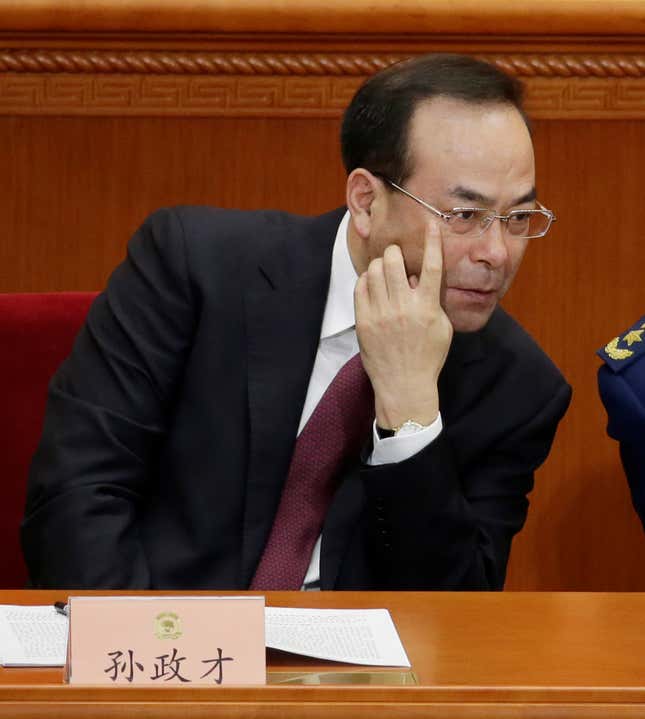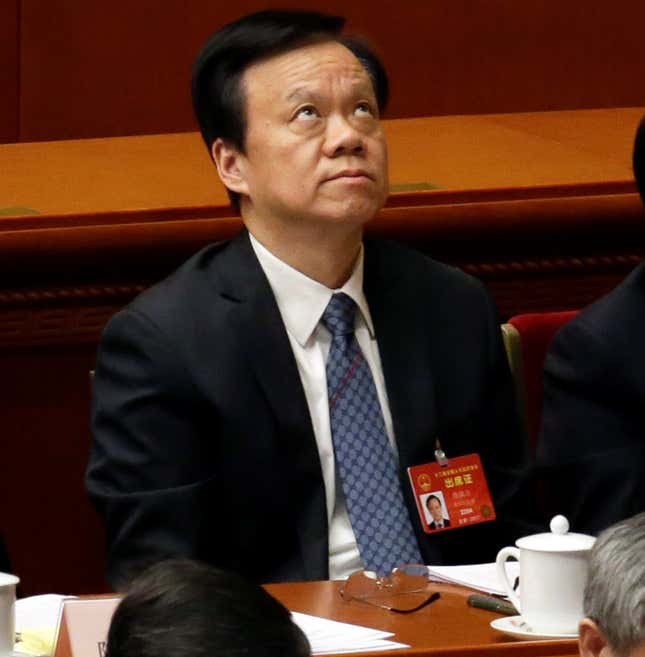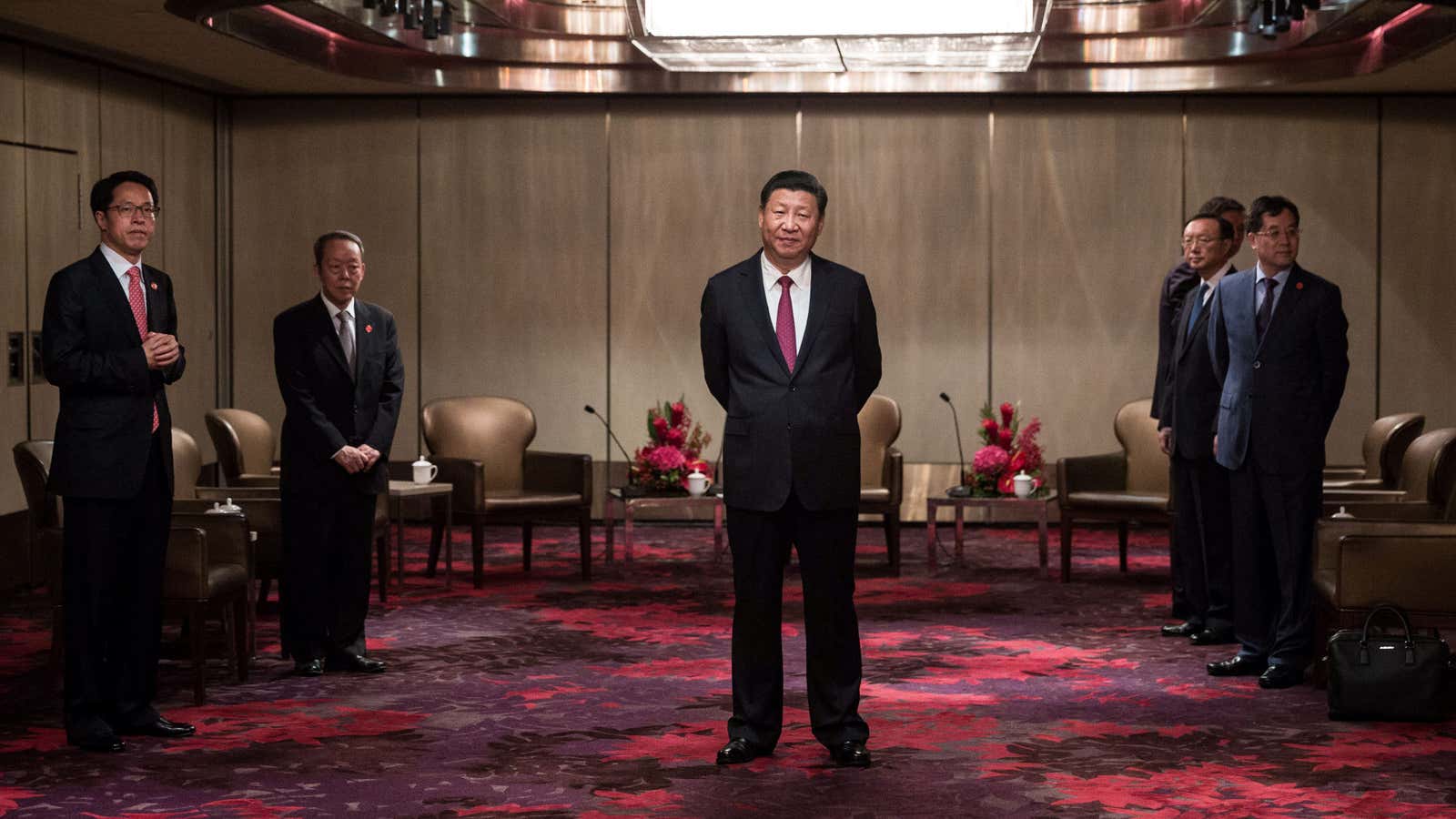China’s political Game of Thrones is arguably as complicated as the TV series.
First, a bit of background: China’s one-party state is ruled by the Chinese Communist Party (CCP), which is run by a seven-member body known as the Politburo Standing Committee (PSC). The second-tier leadership is the broader Politburo, which is composed of 25 people. These party roles outrank and control the government leadership. China’s top leader, Xi Jinping, is the general secretary of the CCP, a title that grants him the job as the Chinese president.
This fall, the party will hold its 19th national congress, at a time yet to be decided. Xi is expected to start his second five-year term as the party boss at the twice-a-decade event. But aside from him, who will make it to the top 25 and top seven is much less certain. With that in mind, the behind-the-scene political struggles are gearing up.
As the big meeting approaches, high-flyers get sacked and underdogs are elevated. Taking past rhetoric into account, all signs are pointing to one thing: Xi will probably defy the conventional 10-year term limit, in order to hold onto power until at least 2027. Here are those signs:
Xi just ousted a strong leadership contender

A Xi Jinping rival for power just fell from grace, right on cue. Sun Zhengcai, who served as the party secretary of the inland city of Chongqing, has been put under investigation for violating party regulations, according to several major Western news outlets including the Wall Street Journal (paywall) and Reuters. The reports came shortly after an official announcement over this past weekend that Sun had been replaced as Chongqing’s top official, without specifying his future post.
Like another up-and-comer, Hu Chunhua, party chief of Guangdong province, Sun is in his early 50s. The two, both promoted to the Politburo in 2012, are the youngest members of the 25-person decision-making body, and have since been widely viewed as the possible successors to Xi and premier Li Keqiang, the party’s No. 2 official. Sun and Hu were looking likely to be elevated to the seven-person PSC during the upcoming congress, and eventually replace Xi and Li during 2022’s congress. But now Sun is dead politically.
Hu is arguably in a better position. In April, Xi gave an unusual endorsement to Hu’s work as the Guangdong party chief, after Hu brutally cracked down on a local village protest and declared his loyalty to the president.
Xi will fill the Politburo with his confidants
Recent personnel changes have suggested that Xi would want to install his own people in the Politburo, which could pave the way for his third term.

The new head of Chongqing is Chen Min’er, 56, who was the party chief of the southwestern province of Guizhou. Chen served as Xi’s propaganda chief during his tenure in the eastern Zhejiang province between 2002 and 2007.
In May, Xi also promoted his longtime associate Cai Qi as party chief of Beijing. Cai, 61, served as a senior official in Fujian and Zhejiang when Xi was the two region’s party bosses.
Both Chen and Cai enjoyed an usually fast career ascent in the last couple of years. By tradition, the posts of party chiefs of Chinese municipalities would assure them seats in the new Politburo. But a Reuters report in March suggested that Chen, then Guizhou party chief, would likely to rise directly to the seven-member PSC, filling a seat that could otherwise be filled by a Xi rival.
What retirement age?
A majority of the current PSC members are expected to step down at this autumn’s congress due to an unwritten rule that members retire at 68. But speculations are mounting that 69-year-old Wang Qishan, the party’s top graft-buster and a close ally of Xi, will seek a second term. Wang’s fate has been closely watched to predict whether Xi himself will linger on beyond 2022.
Late last year, a senior party official dismissed the retirement rule as “pure folklore.”
Xi is already the most powerful Chinese leader in decades
Last but not least, Xi has built a solid political foundation to break away from any convention. Having waged a war against corrupt officials and won official recognition as the party’s “core” leader, Xi is undoubtedly China’s most dominant leader in over three decades. A further power grab wouldn’t surprise many.
